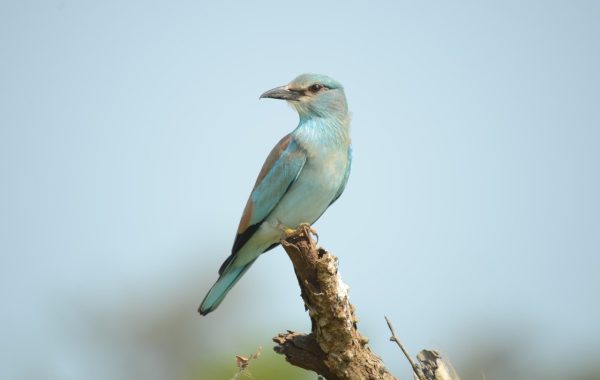A new, much-debated law amendment is currently before the Parliamentary Environment Committee. The bill includes two of the worst amendment proposals we have seen in recent years on illegal bird trapping / poaching. The amendments propose that the offence of capturing and killing 14 non-game bird species with limesticks or a shotgun is punished by a reduced fine, of only 200 euros. Such a low fine would not only fail to provide a deterrent, it would send the message that the illegal killing of these bird species is far less reprehensible than, for example, the illegal killing of a game species, which is punishable by a higher fine of 2000 euros.
The 14 bird species
The choice of the 14 bird species mentioned in the proposed amendments is concerning, as these are birds targeted by bird trappers. Among them are species like the Blackcap, the Bee-eater, the Robin, the Chiffchaff, and the Golden Oriole, all of which are protected by law, and more importantly, are not by any means game species.
What does this mean in practice?
If these two amendments are approved, we are essentially witnessing the indirect decriminalization of the illegal killing of these bird species. If someone for example traps up to 50 birds belonging to any of these 14 species using limesticks, they will receive a fine of 400 euros (200 euro fine for the limesticks and 200 euro fine for trapping the specific bird species). Or, if someone kills up to 50 birds belonging to any of these 14 species using a shotgun (for example, Bee-eaters), then the fine will be only 200 euros. While, if a hunter catches Song Thrushes in mist nest the fine starts at 3000 euros ((2000 euros for illegal use of net and 1000 euros for possession of illegally caught Song Thrush). To give another example of fine levels, if a hunter fails to stop at a check of the Game and Fauna Service, the proposed fine is at 300 euros. It is evident that there is a very deeply flawed logic behind this proposal.
Indirect decriminalization of trapping with the blessings of Parliament?
The indirect decriminalization of illegal bird trapping began in 2016-2017, when the Game and Fauna Service filed amendments to ‘The Protection and Management of Wild Birds and Game Species Law’. One of the main changes approved by Parliament in July 2017 was the on-the-spot fines regulation of all offences. If the fine is not paid, then the offender is taken to court. For most offenses, the fines that have been in force since 2017 begin at 2000 euros. Such high fines serve their purpose, as they are deterrent and punitive penalties. This is confirmed by the table prepared by the Game and Fauna Service that presents the on-the-spot fines for each offence. However, a careful study of the table reveals that there are some on-the-spot fines that are much lower, i.e. at 200 euros, such as, the fine for trapping with limesticks. None of the MPs justified how such a low fine would serve the purpose of preventing illegal bird trapping. On the contrary, it seemed clear from the start that it would serve to encourage ‘traditional’ trapping with limesticks. BirdLife Cyprus expressed its strong opposition to this low fine at the time.
If approved, the new proposal regarding the 14 bird species would add insult to the injury caused by the lower fines for limesticks approved in 2017.
We call on the Chairman and Members of the Parliamentary Environment Committee, as well as all members of the House of Representatives, to reject the specific amendments. This will ensure Cyprus avoids any non-compliance ‘adventures’ with the EU Law regarding illegal bird trapping, but more importantly, it will send the right message regarding protection of birds, both local and visiting.
Risk of further relaxation of law on illegal bird trapping




